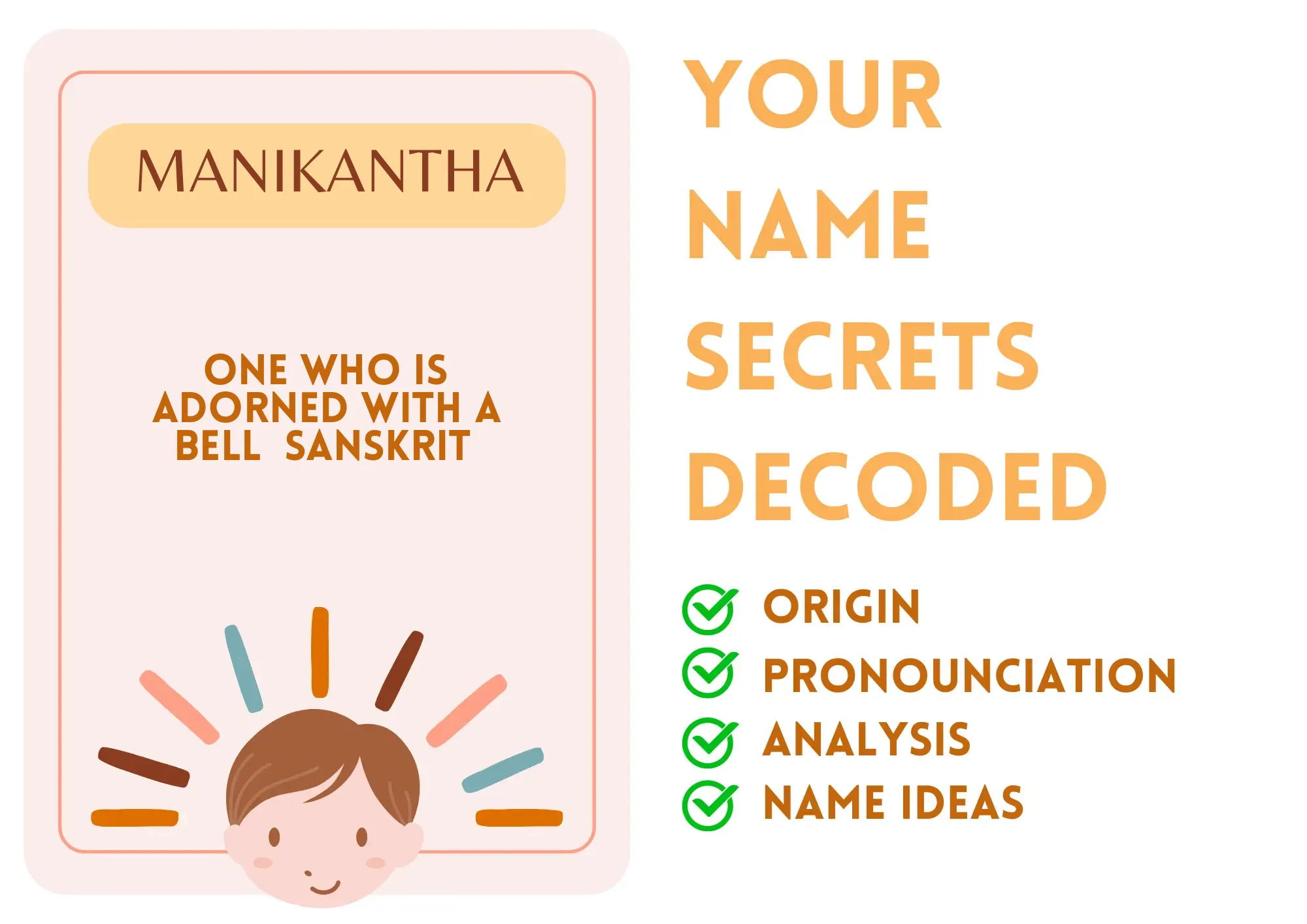
Manikantha
Manikantha is a culturally rich name of Sanskrit origin, signifying 'one who is adorned with a bell' or 'the one who has a bell around his neck.' This name is commonly used in India, especially among Hindu communities, and is predominantly a masculine name but can also be used for females in some contexts. In Hindu mythology, Manikantha is often associated with Lord Shiva and is a name given to him in his aspect as a child.
The name is seen positively, evoking images of auspiciousness, divinity, and protection. It is relatively easy to pronounce and write, though it may be less familiar to non-Indians. Common nicknames include Mani and Kantha.
Though not extensively represented in popular culture, the name is enshrined in Hindu texts and legends. It carries connotations of strength and divine protection, making it a cherished choice among parents.
Basic Information
Gender: Boy
Sounds Like: MAH-nee-KAHN-thah
Pronunciation Explanation: The name emphasizes the second syllable 'nee', with a soft 'th' sound at the end.
Summary and Meaning
Meaning: one who is adorned with a bell (Sanskrit)
Origin: The name Manikantha has Indian origins, deeply rooted in Hindu culture and Sanskrit language.
Usage: Manikantha is traditionally recognized as a masculine name, primarily used for boys.
Name Number (Chaldean)
Name Number (Pythagorean)
Name Constellation (Nakshatra)
Name Zodiac Sign (Rashi)
Popularity (Global Rank)
Overall: 75584
Boys: 54235
Most Popular in
Religious and Cultural Significance
Religion: Hindu
Background: In Hindu culture, the name Manikantha holds significance as it is often associated with deities and symbolizes auspiciousness and divine protection.
Cultural Significance: Manikantha is chosen for its auspiciousness and the protective connotations it signifies, often linked to the divine.
Historical Significance: Historically, Manikantha denotes aspects of divine presence and protection in Hindu mythology. Lord Shiva's avatars may carry this name during certain tales, emphasizing aspects of strength and safeguarding.
Popular Culture
Literature and Mythology: References to Manikantha can be found in Hindu myths, often denoting divine attributes.
Movies and Television: While not frequently used, characters embodying this name appear in some regional dramas, highlighting strength and divine qualities.
Feelings and Perceptions
Perception: Manikantha is often viewed as a blessed name, associated with auspicious beginnings and divine qualities. It is appreciated for its cultural depth.
Positive Feelings: Divine, auspicious, strong, protective, unique.
Negative Feelings: May be considered unusual or hard to pronounce for some non-Hindus.
Practical Considerations
Ease of Writing and Calling: Manikantha is relatively straightforward to write and pronounce, consisting of nine letters and four syllables, making it memorable yet somewhat lengthy.
Common Typos and Misspellings: Manikanta,Manikant,Maniktha,Manikanthaa
Common Nicknames: Mani,Kanta,Kanti
Manikantha Popularity
Manikantha Usage and Popularity By Country
| Country | Rank (Overall) |
|---|---|
| India | 15676 |
| Ghana | 20757 |
| United States | 92424 |
| Canada | 149654 |
Manikantha Usage and Popularity By City
| City | Rank (Overall) |
|---|---|
| HyderÄbÄd | 4980 |
| Bengaluru | 7313 |
| Guntur | 1936 |
| Kakinada | 1543 |
| Bangalore | 6160 |
| Visakhapatnam | 3790 |
| Chennai | 15510 |
| Boston | 19013 |
| Krishna | 4132 |
| ErnÄkulam | 6007 |
Compatibility Analysis
Famous Persons Named Manikantha
No results found for Manikantha.
Related Names
Similar Sounding Names:
Manik,Kantha,Maanik,Madhav